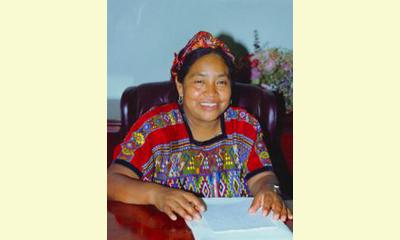|
|
Rosalina Tuyuc Velasquez: Constructing an Inclusive Guatemala
an article by Irmalicia Velasquez Nimatuj, El Periodico, Guatemala
On 10th May, Rosalina Tuyuc Velasquez, a leader of the Kaqchikel people, born in Comalapa, received in Tokyo, Japan, the International Prize Niwano Peace. The recognition is awarded because despite living in a country that has systematically excluded, despised and rejected the life and wisdom of the Mayan people, she has not given up. Instead, she has worked nationally and internationally, from the 1980's to the present time, for the construction of an inclusive Guatemala.

Photo by Niwano Peace Foundation
click on photo to enlarge
Rosalina, besides being an advocate for human rights, is a respected leader and spiritual guide. She is a defender of the right held by indigenous peoples to express and practice their spirituality, an advocate of co-administration of the holy places for communities and the state, which are under threats, both internal and external.
She founded in 1988 - in the midst of the armed conflict - the National Coordination of Widows of Guatemala, Conavigua, which united more than 10 000 women in 300 local groups who use the justice system to defend against the genocide against the Mayan people, against the sexual slavery of women in military deployments, the abduction of children orphaned by war and the impunity of paramilitary structures. The work of Conavigua was key to locate clandestine cemeteries in the country, and to initiate exhumation in regions where they committed the most atrocious massacres, as well as the release of hundreds of young people who were forcibly recruited for military service during the armed conflict .
Rosalina is a woman who inspires, who. no matter how far you have walked, has not ceased to be a companion committed to the promotion of indigenous leaders, both rural and urban. She is a sister determined to show by example the life that all indigenous people are struggling for. She is ready, always, with her profound wisdom to mediate rather than divide, to believe rather than destroy. Simply, but with deep conviction, she continues to lead us down a road that is the daily construction of a just world and a future where a culture of peace will prevail.
(Click here for a Spanish version of this article)
|








|
DISCUSSION
Question(s) related to this article:
The understanding of indigenous peoples, Can it help us cultivate a culture of peace?
* * * * *
Latest reader comment:
Two articles in recent years in CPNN point to the renewed recognition of the importance of indigenous knowledge and traditions to help save us from the ecological disaster of the global industrialized economy.
In the article preparing for the upcoming People's Summit in Rio (See CPNN April 12, 2012), Fabiola Ortiz emphasizes the importance of involving indigenous peoples in the decision-making about development projects.
The indigenous peoples of the Amazon made this argument very dramatically and eloquently in person at the World Social Forum in Belem, Brazil, as described the CPNN article of February 6, 2009.

|
|









